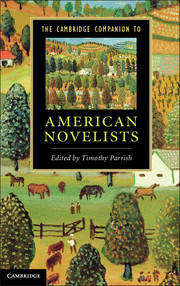Book contents
- Frontmatter
- Contents
- Contributors
- Introduction
- 1 James Fenimore Cooper
- 2 Nathaniel Hawthorne
- 3 Herman Melville
- 4 Harriet Beecher Stowe
- 5 Mark Twain
- 6 Henry James
- 7 Edith Wharton
- 8 Theodore Dreiser
- 9 Willa Cather
- 10 F. Scott Fitzgerald
- 11 Ernest Hemingway
- 12 William Faulkner
- 13 Henry Roth
- 14 Djuna Barnes
- 15 Zora Neale Hurston
- 16 Richard Wright
- 17 Raymond Chandler
- 18 Ralph Ellison
- 19 J. D. Salinger
- 20 Patricia Highsmith
- 21 Vladimir Nabokov
- 22 Jack Kerouac
- 23 Saul Bellow
- 24 Kurt Vonnegut
- 25 John Updike
- 26 Thomas Pynchon
- 27 Toni Morrison
- 28 Philip Roth
- 29 Don DeLillo
- 30 Cormac McCarthy
- Guide to Further Reading
- Index
- References
28 - Philip Roth
Published online by Cambridge University Press: 05 December 2012
- Frontmatter
- Contents
- Contributors
- Introduction
- 1 James Fenimore Cooper
- 2 Nathaniel Hawthorne
- 3 Herman Melville
- 4 Harriet Beecher Stowe
- 5 Mark Twain
- 6 Henry James
- 7 Edith Wharton
- 8 Theodore Dreiser
- 9 Willa Cather
- 10 F. Scott Fitzgerald
- 11 Ernest Hemingway
- 12 William Faulkner
- 13 Henry Roth
- 14 Djuna Barnes
- 15 Zora Neale Hurston
- 16 Richard Wright
- 17 Raymond Chandler
- 18 Ralph Ellison
- 19 J. D. Salinger
- 20 Patricia Highsmith
- 21 Vladimir Nabokov
- 22 Jack Kerouac
- 23 Saul Bellow
- 24 Kurt Vonnegut
- 25 John Updike
- 26 Thomas Pynchon
- 27 Toni Morrison
- 28 Philip Roth
- 29 Don DeLillo
- 30 Cormac McCarthy
- Guide to Further Reading
- Index
- References
Summary
I was a Jewish child, … but I didn’t care to partake of the Jewish character…. I wanted to partake of the national character…. You flood into history and history floods into you. You flood into America and America floods into you.
Philip Roth, I Married a Communist, 1998Philip Roth’s (1933–) recurrent narrator, the novelist Nathan Zuckerman, writes these words as he nostalgically recalls his youth in the late 1940s. Then, all of America lay before him like a golden promise, and he was innocent of the tragedy that would fell his heroic subject, Ira Ringold, a Jew destroyed by his blithe confidence in the American myth of self-invention. Zuckerman exemplifies Roth’s engagement with an enduring preoccupation of American literature: how history floods into – or washes away – the Emersonian self engaged in its own making.
Roth’s contribution to American literature over the course of more than fifty years and thirty books lies in his scrutiny of American selfhood from the vantage point of a late twentieth-century postimmigrant Jewish sensibility. During the postwar period, numerous writers in the United States charged themselves with redefining the category of “American novelist,” teasing out “American” as an indeterminate, pluralistic identity and “novelist” as a maker of many forms. Those writers, Roth among them, did not stray far from their nineteenth-century forebears, such as Hawthorne, Twain, or Melville, who wrested a literary culture from the unique landscape and history by seeking an American idiom and subject matter.
- Type
- Chapter
- Information
- The Cambridge Companion to American Novelists , pp. 280 - 289Publisher: Cambridge University PressPrint publication year: 2012

